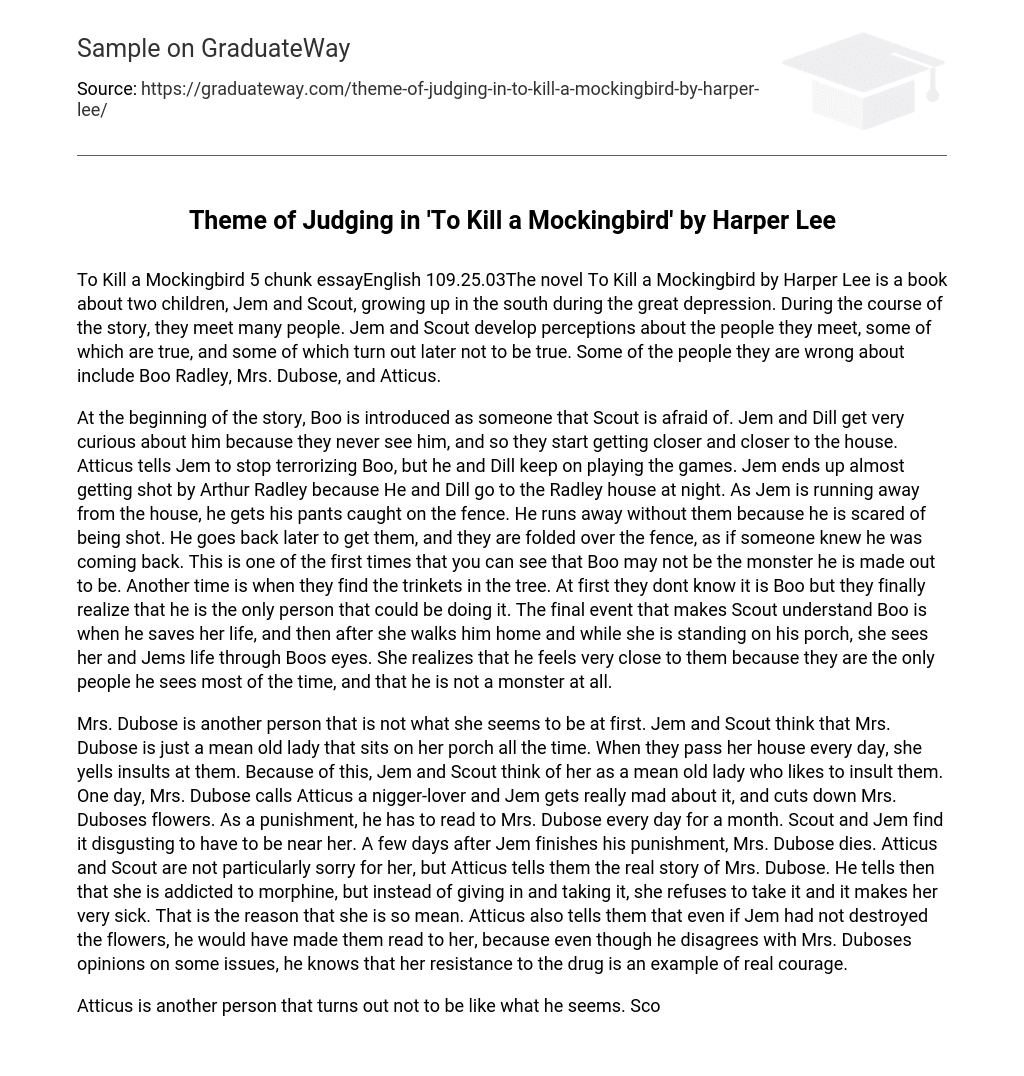During the great depression in the south, Jem and Scout encounter various individuals whom they form their own perceptions of, some of which are ultimately proven false. Included in their misjudgments are Boo Radley, Mrs. Dubose, and Atticus. Initially, Scout is frightened of Boo Radley, and Jem and Dill’s curiosity about him prompts them to approach his house. Despite Atticus cautioning Jem to stop tormenting Boo, he and Dill persist in their games. This leads Jem to almost being shot by Arthur Radley after venturing to the Radley house with Dill at night. While fleeing the scene, Jem’s pants become snagged on the fence.
He flees in fear of being shot, leaving his belongings behind. However, he returns later to retrieve them and finds them neatly placed over the fence, suggesting that someone anticipated his return. These incidents challenge the prevailing belief that Boo is a frightening figure. Another instance is when they discover gifts hidden in the tree, initially unaware of Boo’s involvement, but eventually realizing that he is the only plausible person responsible. The ultimate event that changes Scout’s perception of Boo is when he saves her life. As she walks him back home, the view from his porch provides her with an insight into their lives, making her understand how closely he feels connected to them as he rarely encounters other people. This experience leads her to discover that Boo is not a monster after all.
Initially, Jem and Scout view Mrs. Dubose as an unpleasant elderly lady who constantly hurls insults at them from her porch. In a fit of anger after Mrs. Dubose calls Atticus a derogatory term, Jem reacts by cutting down her flowers. As a consequence, Jem is assigned the task of reading to Mrs. Dubose daily for a month. Both Jem and Scout find the experience of being in her presence repugnant. However, a few days after completing his punishment, Mrs. Dubose passes away. Atticus informs Scout and Jem about the true nature of Mrs. Dubose, revealing that she was addicted to morphine but made the decision to overcome her addiction by abstaining from it despite the illness it caused her.
Scout believes that her father, Atticus, is not capable of doing much, causing her to feel envious of other parents who engage in activities like playing in a town football game. However, Scout’s perception of Atticus changes when she learns that he would have made them read to Mrs. Dubose even if Jem had not destroyed her flowers. Atticus explains that despite his disagreement with Mrs. Dubose’s opinions on certain matters, he admires her courage in resisting the drug addiction. This realization shows Scout that Atticus is not what she originally thought. Additionally, Scout discusses her feelings with Mrs. Maudie, who highlights Atticus’ capabilities. Later on, Scout and Jem discover that their father is actually the most skilled shooter in all of Maycomb county, leading Scout to feel remorseful for underestimating his abilities.
At the end of the book, Scout recognizes her father’s goodness. She learns that he is the only person in Maycomb who is willing to stand up for what is right, even when no one else will. This realization deepens her love for him compared to her peers’ fathers. Throughout the story, Scout and Jem tend to judge people based on their appearance or behavior when they first meet them. This includes making assumptions about their own father based on their long history of living with him.
The text highlights the misconception people often possess about others, leading to misjudgments based on appearances or attitudes. Such preconceived notions, however, can be altered by an event that reveals the true nature of those individuals. This phenomenon occurs frequently in our daily lives. People get unfairly assessed due to their appearance or behavior, when in reality, they are not as they seem. For instance, someone dressed in black with spikes may be labeled as a goth without anyone exploring further. If only given the chance to meet the person, they could potentially establish a meaningful friendship. Unfortunately, due to constant judgment, such opportunities are missed out on. If people refrained from making hasty judgments, everyone would experience increased happiness and strengthen their friendships.





